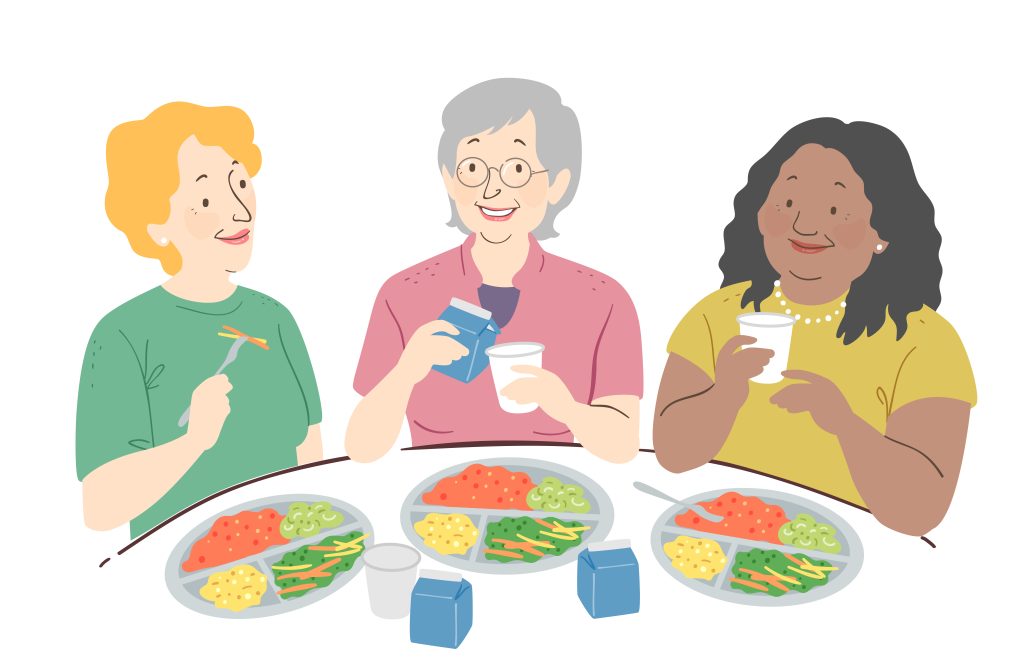Fasting has long been part of various therapeutic and religious practices, and is often adopted as a weight loss technique by women during menopause.
Historically, Intermittent Fasting has been suggested to improve conditions, which are often experienced by midlife women, including metabolic syndrome, rheumatic disease, osteoporosis and hypertension [1][2]. In Ayurveda, fasting or ‘upavasa’, has been used to improve digestion and to fight against symptoms of diseases [1].
Fasting and Bone Health
Bone health and muscle function decline with age, and although fasting has been shown to improve bone health by affecting hormone production, the metabolism of calcium and phosphate (the main components of bones), and helping against inflammation and pain, menopausal women should still ensure a sufficient intake of calcium from food [1].
- Include sources of Calcium into your diet, including dairy, green leafy vegetables, fruit, beans, and nuts
Bone health is also affected by the decrease in estradiol and estrogen hormones during menopause, which increases the risk of osteoporosis [2][3]. Vitamins and minerals such as vitamin D, vitamin K, Selenium, Magnesium and Beta-carotene are essential to preserving bone health and bone mineral density (BMD)[2]. Make sure to:
- Consume foods high in vitamin D, such as fish, eggs and red (but non-processed) meat
- Include green leafy vegetables such as spinach, broccoli, kale and lettuce, which are sources of vitamin K
- Consume Selenium from meat, fish, nuts, eggs and cereals
- Eat food sources of Magnesium like green leafy vegetables, beans, pulses and nuts
- Include foods containing Beta-carotene: yellow and green vegetables, as well as yellow fruit, such as mango
Metabolism and Fats during Menopause
One of the most common changes that occur during menopause is an altered lipid profile – higher LDL cholesterol (the bad cholesterol) and lower HDL cholesterol (the good cholesterol). Therefore, it is essential that during intermittent fasting, women consume good sources of unsaturated fats, which naturally increase HDL cholesterol, and consume less saturated fats – which will have the opposite effect and decrease LDL cholesterol [1].
- Aim to replace saturated fats from butter and hydrogenated oils with plant oils such as olive or rapeseed oil
- Limit your intake of foods containing saturated fat. Some of these foods include processed red meat (like sausages and bacon), full-fat dairy, crisps, biscuits and cake. If buying snacks, check the content of saturated fat on the label of the product, and choose those with a lower content
- Consume oily fish, such as salmon or mackerel, at least twice per week. Oily fish contains Omega-3 fatty acids, which will help increase HDL cholesterol
Body Composition
The switches in body composition that occur with age in women, i.e. loss of muscle mass and increase in fat mass, are also linked to the decrease in estrogen production during menopause. Studies have found that sufficient consumption of protein in the menopausal transition can help maintain muscle mass [4].
Consume a source of protein at each meal during your fasting window. For example, lean meat (chicken, turkey and lean cuts of pork), fish and seafood, as well as beans and legumes (peas, soy and lentils)
Combining Fasting with a Mediterranean-type Diet during Menopause
A Mediterranean diet has been well-researched for the prevention of bone, metabolic and heart diseases post-menopause [4].
- Specific components of the Mediterranean diet that women can focus on include Beta-carotene, Selenium, vitamin C (found in citrus fruit, peppers, berries and broccoli) and vitamin E (from plant oils, nuts, seeds and cereals)
These nutrients act as antioxidants to protect against damage to cells [4].
The main food and micronutrient constituents present in the Mediterranean Diet are included below [4]:

Plant Estrogens
In addition, the consumption of plant estrogens can be beneficial in the relief of menopause symptoms [3]. Therefore:
- Include sources of plant estrogens in your diet several times per day from soya and linseeds, for example,
References:
[1] Nair PMK and Khawale PG. Role of therapeutic fasting in women’s health: An overview. Journal of Midlife Health. 2016 April; 7(2):61–64. Link
[2] Silva TR, Oppermann K, Reis FM, and Spritzer PM. Nutrition in Menopausal Women: A Narrative Review. Nutrients 2021 July; 13(7):2149. Link
[3] British Dietetic Association. Menopause and diet: Food Fact Sheet. Accessed: 2022 May Last reviewed: 2022 May. Link
[4] Brończyk-Puzoń A, Piecha D, Nowak J, Koszowska A, Kulik-Kupka K, Dittfeld A and Zubelewicz-Szkodzińska B. Guidelines for dietary management of menopausal women with simple obesity. Przeglad Menopauzalny. 2015 March; 14(1):48–52. Link

